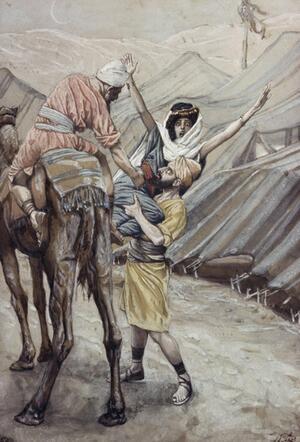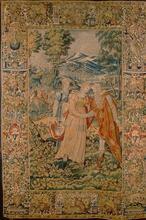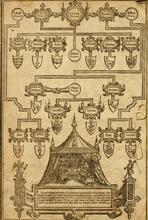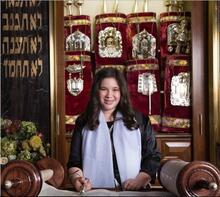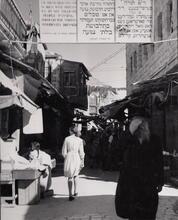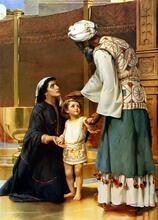Dinah: Midrash and Aggadah
Dinah was the only daughter of Jacob and Leah, and the Rabbis present her as possessing many positive qualities, as was fitting for the daughter of the progenitors of the Israelite nation. The rabbis also offer many different explanations for the rape of Dinah, trying to understand the troubling story. They explain the rape as punishment for Jacob, punishment for Leah, or a result of Shechem’s evil, or they place the fault with Dinah herself. The rabbis also state that Dinah went down to Egypt with Jacob, and they name various potential husbands for Dinah.
Dinah was the only daughter of Jacob and Leah, and the Rabbis present her as possessing many positive qualities, as was fitting for the daughter of the progenitors of the Israelite nation.
Her Birth
The Rabbis state that Leah was actually pregnant with a son; when Rachel saw that her sister was pregnant, she prayed, resulting in a change of the embryo’s gender (JT Berakhot 9:3, 14a). Another tradition relates that Leah, and not Rachel, was responsible for this change: Leah knew that Jacob would be the father of twelve tribes. When she realized that she was with child and that Jacob already had ten sons (she had borne him six sons, Bilhah and Zilpah had each given birth to two sons), she said: Shall my sister Rachel not even be as one of the handmaidens? Leah therefore prayed to God on behalf of her sister, entreating Him: “Turn what is in my womb into a female, and do not prevent my sister from bearing a son.” God accepted her prayer and the fetus in her womb was transformed into a girl. Gen. 30:21 therefore states: “Afterwards she bore him a daughter,”—that is, after Leah’s prayer. Since Leah had rendered judgment [danah din] on herself, the newborn was named Dinah (BT Berakhot 60a; Tanhuma [ed. Buber], Vayeze 19).
According to another midrashic etymology, each of Jacob’s children was born together with his future spouse, except for Dinah, who was born alone. It therefore was said of her: This girl is with justice [din] and judgment (Pirkei de-Rabbi Eliezer [ed. Higger], chap. 35).
In an attempt to resolve the discrepancy between the list of those who went down to Egypt with Jacob and the total number of seventy given in the Torah she-bi-khetav: Lit. "the written Torah." The Bible; the Pentateuch; Tanakh (the Pentateuch, Prophets and Hagiographia)Torah, the Rabbis assert that a twin was born together with Dinah, and she was one of the seventy souls who came with Jacob (BT Bava Batra 123a).
The Episode of Dinah and Shechem Son of Hamor
The Rabbis note that Shechem was a city predestined for evil happenings: Dinah was abused there, it was the place of Joseph’s sale, and the kingdom of the Davidic line was divided in this city (BT Sanhedrin 102a). The story of Dinah is one of the most difficult Biblical narratives, and the Rabbis offered different explanations for how Jacob’s daughter became involved in this episode.
1. As Punishment for Jacob
In an attempt to come to terms with the rape of Dinah, the Rabbis suggest that this was a punishment for her father. What was his sin? According to one tradition, he was punished for what he had said upon building the altar in Shalem upon his return from Paddan-aram. Gen. 33:20 tells that “he set up an altar there, and called it El, God of Israel.” The A type of non-halakhic literary activitiy of the Rabbis for interpreting non-legal material according to special principles of interpretation (hermeneutical rules).midrash reads this as “he called himself el [god].” Jacob said: You are God in the heavens, and I am God on earth; since he usurped authority for himself, he was punished by the rape of his daughter (Gen. Rabbah 79:8).
Another tradition has Jacob punished for what he said to Laban when they divided the flock between themselves (Gen. 30:33): “In the future when you go over my wages, let my honesty toward you testify for me.” He boasted that his honesty would later come to light, which was not at all certain. Instead, Jacob should have acted as Prov. 27:1 counsels: “Do not boast of tomorrow, for you do not know what the day will bring.” He accordingly was punished “tomorrow” (that is, in the future). Instead of “let my honesty toward you testify [ve-antah] for me,” his daughter was abused [va-yeaneha]; and his honesty was not acknowledged (Gen. Rabbah 73:9).
A third tradition suggests that Jacob’s tardiness in honoring his vow was the cause of his punishment. When he was in Bethel, during his flight from Laban, he vowed that if God favored him, he would return to Bethel and there erect an altar to the Lord (Gen. 28: 20–22). Jacob, however, procrastinated in fulfilling his pledge: first he lived in Laban’s house for twenty years, and even after returning to Canaan, he first dwelled in Shechem. He therefore was punished by experiencing all three of the cardinal sins of idolatry, forbidden sexual relations, and bloodshed: forbidden sexual relations—by Shechem’s rape of Dinah; bloodshed—the ensuing slaughter of the inhabitants of Shechem by Simeon and Levi; and idolatry—following this massacre, Jacob commands all the members of his household to rid themselves of foreign gods (Lev. Rabbah 37:1).
Yet another tradition claims that Jacob was penalized for preventing Dinah from marrying his brother Esau. Before his encounter with the latter, Jacob sent his family across the Jabbok River, as we are told in Gen. 32:22: “That same night he arose, and took his two wives, his two maidservants, and his eleven children.” The midrash asks: Where was Dinah? and answers that he had locked her in a chest, saying: “So that Esau should not see her and take her from me.” God told him: You withheld Dinah from your brother, and, due to her good attributes, she could have reformed him. Since you did not want to give her to Esau, who was circumcised, you are punished through her being taken by one who was uncircumcised (Shechem son of Hamor); you did not give her in legitimate matrimony, therefore you are punished by her being taken by Shechem illegitimately (Gen. Rabbah 76:9; Tanhuma [ed. Buber], Vayishlah 19).
2. As Punishment for Leah
The Rabbis alternately explain the rape of Dinah as retribution for Leah’s improper behavior regarding the mandrakes. In the Biblical account, Reuben found mandrakes (an aphrodisiac) in the field, and brought them to his mother Leah. Rachel, who was barren, asked Leah to sell them to her, in return for forgoing her right to be with Jacob that night. Gen. 30:16 tells that upon Jacob’s return from the field, Leah came out to greet him and called him to come to her tent. According to the Rabbis, Leah was bedecked as a harlot when she went to meet her husband. For acting in such an immodest manner, she was punished by her daughter behaving in the same fashion when she went out to visit the daughters of the land (Gen. Rabbah 80:1).
Another midrashic explanation of Leah’s sin with the mandrakes is that she was ungrateful to Rachel. God asked her: Is this the reward for a good deed? Is this the reward of your sister Rachel, who gave you her signs with her husband [that Jacob and Rachel had agreed upon, so that Laban would not be able to deceive Jacob], to spare you embarrassment on your wedding night? As punishment for this behavior, God caused Leah even greater embarrassment with the episode of Dinah (Gen. Rabbati, Vayishlah, p. 168).
3. Shechem’s Guilt
The Rabbis compare Shechem to a snake that bites a person within his own home. They relate that Dinah would stay within her tent and not go about, as was fitting for a daughter of Jacob. But Shechem enticed her to come out, by bringing young women drummers who played outside her tent. When Dinah emerged from her tent to see the “daughters of the land” playing, he kidnapped her.
4. Dinah’s Responsibility
In contrast to these approaches, another conception stresses Dinah’s responsibility for her conduct and the consequences of her actions. The proponents of this view argue that her father and brothers would sit in the academy and study, while she preferred to go out and see the daughters of the land (Avot de-Rabbi Nathan, version B, chap. 3). Dinah desired to be seen, and not just to see others. She wanted the land’s young men to see her beauty, and Shechem did indeed see her and desire her. The Rabbis compare this to a person who goes into the marketplace holding a piece of meat in his hand, with a dog following him. Eventually the dog will succeed in grabbing the meat from his hand. According to this analogy, Shechem’s general behavior was completely unbridled, totally lacking any self-control; Dinah should have been careful, and not shown him her beauty (Tanhuma [ed. Buber], Vayishlah 19). Some Rabbis claim that Dinah is representative of the weakness from which all women suffer. God took the care to create woman from a rib, which is a concealed, modest place; notwithstanding this, women like to go out to public places (Gen. Rabbah 18:2). The instance of Dinah casts light on the danger at hand when any woman goes out to the marketplace (Gen. Rabbah 8:12). These dicta reveal the anxiety of the Rabbis at the thought of their wives and daughters leaving the protected home for the marketplace and the streets of the city.
Dinah’s End
When Simeon and Levi came to the city and killed Shechem and Hamor, they extricated Dinah from Shechem’s home. Since they risked their lives for her, the Torah (Gen. 34:25) calls them, specifically, “Simeon and Levi, brothers of Dinah” (Mekhilta de-Rabbi Ishmael, Masekhta de-Shirah, Beshalah 10). The Rabbis relate that the brothers were forced to drag Dinah out, because she was too ashamed to leave Shechem’s house. Finally, Simeon vowed to her that he would marry her. They wed, and a son was born from this union, “Saul the son of a Canaanite woman” (Gen. 46:10); Dinah was the “Canaanite woman,” because her behavior was like that of the Canaanites. According to another explanation of this appellation, when she died, Simeon buried her in Canaan (Gen. Rabbah 80:11).
A different midrash relates that Dinah was married to Job, basing this on Job’s telling his wife: “You talk as any shameless woman [ha-nevalot] might talk!” (Job 2:10), and on the episode of Dinah in Gen. 34:7: “because he had committed an outrage [nevalah] in Israel” (Gen. Rabbah 19:12). Dinah converted Job, and therefore Jacob had erred when he opposed her being married to his brother Esau, a union which would have led to the latter’s reformation (see above) (Tanhuma [ed. Buber], Vayishlah 19).
According to another midrashic account, Dinah was impregnated by Shechem and gave birth to Asenath. Jacob’s sons wanted to kill the baby, so it would not be said that there was harlotry in Jacob’s tents. Jacob brought a gold plate and wrote on it the name of the Holy One, blessed be He; according to another tradition, he recorded on it the episode with Shechem. Jacob hung the plate around Asenath’s neck and sent her away. God dispatched the angel Michael to bring her to the house of Potiphar in Egypt; according to another exegetical tradition, Dinah cast Asenath on the wall of Egypt (i.e., the wall surrounding the palace). That day Potiphar went out for a walk with his servants next to the wall and heard the infant’s crying. When they brought the baby to him, he saw the plate and the record of the episode. Potiphar told his servants, “This girl is the daughter of great ones.” He brought her to his home and gave her a wet nurse. Potiphar’s wife was barren, and she raised Asenath as her own daughter. Consequently, she was called “Asenath daughter of Poti-phera,” for she was raised in the home of Potiphar and his wife, as if she were their own daughter (Pirkei de-Rabbi Eliezer [ed. Higger], chap. 37; Midrash Statements that are not Scripturally dependent and that pertain to ethics, traditions and actions of the Rabbis; the non-legal (non-halakhic) material of the Talmud.Aggadah [ed. Buber], Gen. 41:45).
These different midrashic accounts of Dinah’s marriage teach that Dinah overcame the episode of her rape by Shechem, rehabilitated herself and was married. According to some of these traditions, either she herself or her daughter married some family member from Jacob’s clan. Her descendants included renowned individuals.

